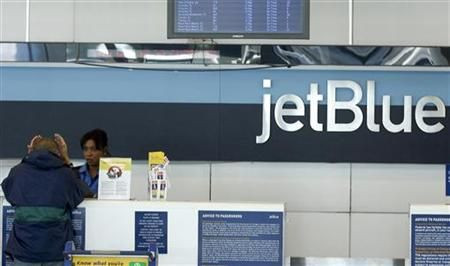JetBlue & American Airlines Passengers Stranded on Planes in Connecticut for over 7 Hours

It was a travel nightmare this weekend for passengers aboard three JetBlue planes and one American Airlines plane when they found themselves stranded on the tarmac for over seven hours on Saturday at Bradley International Airport in Hartford, Conn.
Following the rare October snowstorm in the Northeast, travelers on the flights were diverted from New York-area airports. What started out as a momentary wait continued into a nightlong ordeal. The passengers reportedly experienced backed-up toilets, little or no food, and a quickly dwindling supply of potable water.
After spending seven hours or more on the tarmac, the passengers were then let off the planes and, due of a lack of available hotel rooms, had to spend the night on cots and chairs in the airport terminals at Bradley International.
JetBlue spokeswoman Victoria Lucia told The Associated Press that six of its planes carrying a total of about 700 passengers were diverted to Hartford as a result of a confluence of events including equipment failures at Newark and John F. Kennedy International Airport. Once the planes landed at Bradley, intermittent power outages made refueling and deplaning difficult, according to Lucia.
An American Airlines spokesmen told The AP that passengers were not allowed off the plane by customs at the Hartford airport.
When passengers awoke on Sunday morning after spending the night in Hartford, they were forced to wait in lines for hours just to figure out which flights they would be on to continue to their final destination.
JetBlue has said that passengers that were diverted to Bradley International will be reimbursed for their fares and hotel expenses.
The carriers that stranded passengers on Saturday could face hefty fines from federal regulators due to a new rule adopted in April, 2010. The Transportation Department created the rule to impose a fine of up to 27,500 per passenger per flight that is left on the tarmac for over three hours if the passengers do not have a chance to deplane.
The rule has yet to be enforced since lengthy delays reported by carriers often fall under some exceptions.
Often low-cost airlines are hesitant to allow passengers off planes because contracts typically state that passengers will be reimbursed for hotels, food and transportation. Consequently, these airlines will do everything they can to keep passengers on board in hopes that the plane will be allowed to take off again.
© Copyright IBTimes 2025. All rights reserved.






















